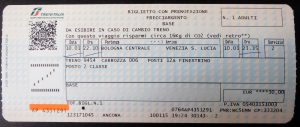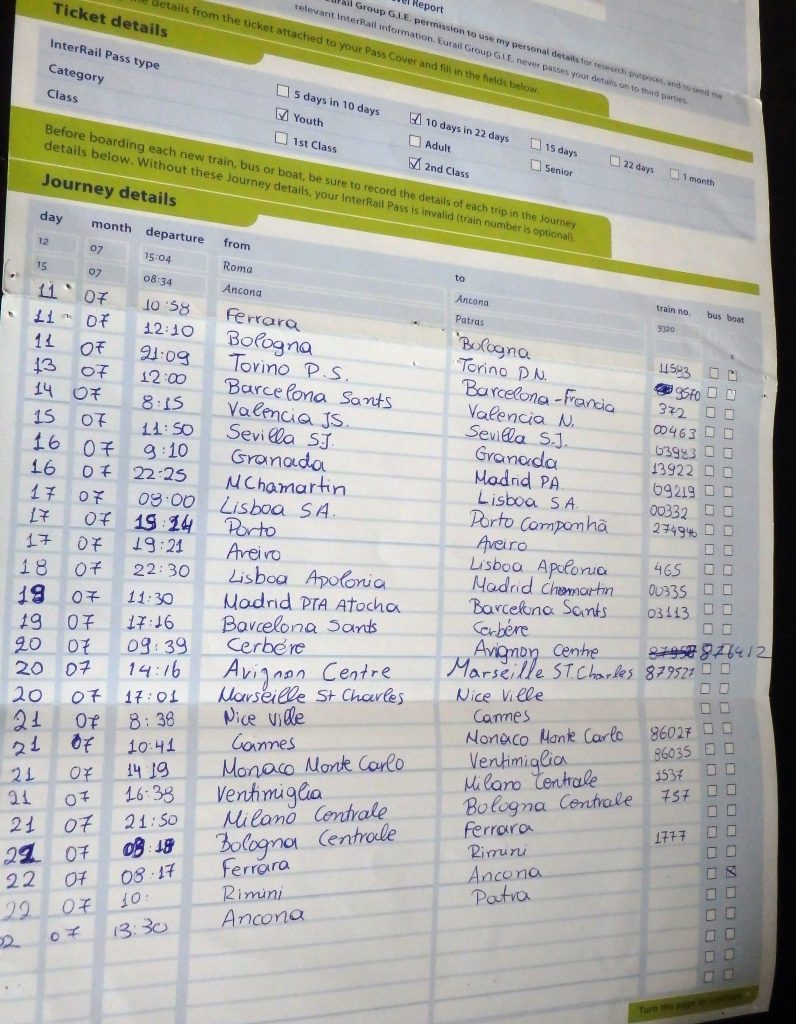Train Tickets and Passes
Planning a train trip, you can get quite confused with all the ticket and pass options. Let’s make things a bit more clear for you. There are the standard tickets (from point A to point B), local offer tickets (offers for regions, groups etc.) and rail passes (like an unlimited-use open ticket, valid for one or more countries for several days):
Standard tickets

These are the point-to-point tickets that take you from point A to point B. They are available for 1st class (business class) and 2nd class (tourist class). Such tickets might or might not include a seat reservation. If it includes a reservation, the seat number will be written on your ticket. If not, either you cannot reserve a seat for this train (e.g. regional trains), or you have the option to issue a reservation separately.
Most rail companies in Europe offer tickets on demand, similar to the plane booking system: there is the full fare for a route (e.g. $60 standard fare) and the limited-availability offer tickets (eg. $29/ $39/ $49). For example, the first 20 tickets of a train may cost $29, the next 20 tickets may cost $39 and the next 20 tickets may cost $49. From there on, every other ticket will cost the standard, full fare. That means that there are 60 discounted tickets for this train and the first 60 persons that book will get them. The earlier you book in advance , the bigger the chances that you find a lower priced ticket. For less popular routes, you can find discounted tickets even last minute.
Local rail offers
Regional offers: There are tickets that offer unlimited travelling within a defined region (e.g. the ‘Bavaria ticket’ offers unlimited traveling inside Bavaria). Usually regional trains participate in such offers.
Offers for specific days/times: There are offers for weekends, weekdays or linked to an event.
Offers for groups: There are offers for two or more persons travelling together. Groups may also get a discount on the normal price.
Discounted tickets for age groups: Children, young people (<26), seniors and families are usually entitled to discounted prices and special offers.
Event discounts: If you are traveling to a big event (festival, concert etc.), you might be eligible for a discounted price.
Rail passes

“Pass” is a type of travel document that entitles you to travel on trains in a specific geographic area (one or more countries), for specific number of days. It’s like an unlimited-use ‘open ticket’. There are the popular Interrail and Eurail Passes, valid in one or more countries. There are also some independant national rail companies that offer their own rail passes (e.g. The Swiss Travel Pass in Switzerland).
The concept of a rail pass, is that the pass will be your ticket for unlimited traveling within one or more countries. When you hold a rail pass, you will not need to buy a separate ticket for each train you use. You might need to pay for a seat reservation for some types of trains (e.g. high-speed trains), but the idea is that holding such a pass you can jump on and off all the participating train companies, be free, spontaneous and save money. The concept is great, the feeling as well.
The Interrail/ Eurail Passes
What is the difference between Interrail and Eurail passes?
The concept of the Interrail and Eurail pass is pretty much the same. One main difference is that the Interrail pass can only be used from European citizens or non-European citizens who can prove that they reside in Europe. The Eurail pass can be used from non-European citizens or residents.
Some other differences between the Interrail and Eurail passes are:
- The Interrail pass gives you the option of either a “one country pass” valid in a specific country, or a “global pass” valid in all participating countries. The Eurail pass gives you the above mentioned options but also a third option: the “Select Pass”, where you can choose 2, 3 or 4 bordering countries to travel
- You can travel to Great Britain and Macedonia with an Interrail Pass, but not with an Eurail Pass.
- Interrail passes are valid from 15 days to 1 month while Eurail passes are valid from 15 days to 3 months
- The Interrail pass also offers discounted tickets to seniors (over 60 years old).
The Travel Duration:
A pass can be either valid for ‘continuous’ days, giving you a whole period of time where you can use trains (for example valid for 15 consecutive days) , or “flexible”, giving you a specific number of travel days –the days that you intend to use trains- within a period of time (for example 5 days within 15 days). In this second case, your pass will have some boxes where you will fill in each date that you use the pass, validating it for this date. Do not fill in the dates in advance. Once you write in one box, the date will be considered used even if you changed your mind and did not travel on this date. Fill in each date just before you take the first train for the day.
These two travel duration options give you the opportunity to get the right pass for your needs. If you plan to have a dense trip, using trains almost every day, you can get a ‘continuous’ pass. If you plan to spend more days in each destination, you can get a flexible pass and use it only for the days that you use trains.
The Travel Area: A pass can be valid either in a specific country (“one country pass”) or in all participating countries (“global pass”). In the case of Eurail pass there is also the “select pass” option, with the choice of 2, 3 or 4 bordering countries.

Example of an Interrail pass.
The Interrail Pass
The Interrail passes can only be used from European citizens or non-European citizens who can prove that they reside in Europe.
There are 30 countries participating in the Interrail offer: Austria, Belgium, Bosnia-Herzegovina, Bulgaria, Croatia, Czech Republic, Denmark, Finland, France, Germany, Great Britain, Greece, Hungary, Ireland, Italy, Luxembourg, Macedonia, Montenegro, Netherlands, Norway, Poland, Por- tugal, Romania, Serbia, Slovakia, Slovenia, Spain, Sweden, Switzerland and Turkey.
There are two types of Interrail Passes: The “One Country Pass” and the “Global Pass”.
The “One Country Pass” is valid for one specific country (for example “Italy Pass” is valid only within Italy, “Spain Pass” is valid only within Spain etc.). There are also some “Premium” and “Plus” Passes in this category which entitles you to also use boats, cross the borders to a neighboring countriy, add extras and other benefits. The “One Country Pass” gives you 3, 4, 6 or 8 days to travel within one month.
The “Global Pass” is valid in all the participating countries. Here you have more options: The minimum you can get of a Global Pass is 5 travel days within a period of 15 days. If you need more travel days or duration than that, you have the options of 7, 10 or 15 travel days within a period of a month. On the other side, if you have a more dense travel plans, you can get a continuous pass, which will be valid for a whole of 15 days, 22 days or for a whole month.
The Eurail Pass
The Eurail passes can only be used from non-European citizens or residents.
There are 28 countries participating in the Eurail offer: Austria, Belgium, Bosnia-Herzegovina, Bulgaria, Croatia, Czech Republic, Denmark, Finland, France, Germany, Greece, Hungary, Ireland, Italy, Luxembourg, Montenegro, Netherlands, Norway, Poland, Portugal, Romania, Serbia, Slovakia, Slovenia, Spain, Sweden, Switzerland and Turkey.
There are three types of Eurail Passes: The “One Country Pass”, the “Select Pass” and the “Global Pass”.
The “One Country Pass” is valid for one specific country (for example “Italy Pass” is valid only within Italy, “Spain Pass” is valid only within Spain etc.). The “One Country Pass” gives you 3, 4, 5 or 8 days to travel within one month.
The “Select Pass” is the next option, in the case you plan to travel to more than one country but not more than four bordering countries. With this pass, you can choose 2, 3 or 4 bordering countries to travel. With the “Select Pass” you can have 4 (only for the 2-countries pass), 5, 6, 8 or 10 travel days to be used within a period of 2 months.
The “Global Pass” is valid in all of the participating countries. Here you have more options: The minimum you can get of a Global Pass is 5 or 7 travel days within a month. If you need more travel days or duration than that, you have the options of 10 or 15 travel days within two months. On the other side, if you have a more dense travel plan or you plan travelling longer, you can get a con- tinuous pass, which will be valid for the whole period of 15 days, 22 days, 1 month, 2 months or 3 months.

Sunset at Amsterdam train station
Important to know when traveling with an Interrail/Eurail pass
The 19:00 o’clock rule
If you hold a flexible pass, the 19:00 o’clock rule can help you save precious travel days. According to this rule, if you catch a night train that departs after 19:00 and arrives at its final destination after 04:00 in the morning, you can use only the arrival date as a travel day on your pass –even if you arrive to your destination before 04:00! For example, if you depart on 6th July at 20:00 and you arrive on 7th July at 06:00, you will write only the 7th July down on your pass. If the train arrives at its final destination at 06:00 but your stop is at 03:30, you can still use this rule and write down only the arrival day). However, you cannot use this rule at the very beginning of your trip when your pass is not valid yet. For example, if your pass is valid from the 7th July, you cannot catch a train on 6th July using the 19:00 o’clock rule.
Ferries: The same rule applies to free night ferry crossings, this time regardless the departure or arrival time. If you use a ferry, you are free to choose whether you prefer to use the departure or the arrival date as a travel day on your pass.
Pass holder benefits
As an Interrail/Eurail pass holder, you are entitled to several benefits from the first day that your pass is valid until the last one. Those benefits include discounts and special offers on accommoda- tion, transportation, events, museums, sightseeing and other activities. You do not have to use a travel day to get a benefit. For example, if you have a pass of 5 travel days within a period of 15 days, you are entitled to the benefits of the pass all 15 days. For a full list of benefits, check the official Interrail/ Eurail websites.
Travelling within your country of residence
Generally, you are not allowed to use an Interail/Eurail pass to travel within your own country of residence. However, you are allowed to use your pass for two trips within your country of residence:
One outbound journey on the first day of your trip, in order to cross the borders by train or reach an airport or port in your country.
One inbound journey on the last day of your trip to take you to any location inside your country. Those two journeys have to be on a valid travel day. That means that if you have 5 travel days and you spend the 2 of them to get out and back into your country, you will still have 3 travel days to travel abroad.
Availability on French trains
Many trains in France offer limited seats for Interrain/Eurrail pass holders. You will have to reserve a seat in advance and if there is no available seat for pass holders on this train you will not be able to travel using your pass. In peak seasons, those trains often get fully booked, so you are advised to reserve a seat as soon as possible. If you will not find an available seat as a pass holders, you can either purchase a normal ticket, or try to find an alternative route with trains that still have pass holder availability or do not need seat reservations (e.g regional trains).
How to book reservations online?
- Official rail websites usually sell seat reservations for pass holders. In the search engine of each website you can request an advanced search: there you can find the option to pay only for a seat reservation, or the supplement needed for Interrail/Eurrail pass holders.
- You can book a reservation through the Interrail / Eurrail official websites themselves.
- You can book a seat reservation at the train station before you depart. You can also book future seat reservations.
Interrail / Eurail Pass examples
Confused? Here are some simple examples. Read them through and everything will make sense:
(In those examples, we assume that the travelers are EU citizens and therefore consider Interrail Passes, however the way of thinking is the same for Eurail Passes).
One country pass: Exploring Italy
For this plan, he will need 3 travel days: Travel day 1 (1st day): Milan – Venice Travel day 2 (4th day): Venice – Florence Travel day 3 (6th day): Florence – Rome
Therefore, he will consider the One Country Interrail Pass for Italy, for 3 travel days within a month.
In case that he would like to go back to Milan after Rome, and therefore would need 4 travel days, he would consider two options:
- Buy the One Country Interrail Pass for Italy, for 4 days within a month.
- Check the prices of standard train tickets for those train routes and buy a separate ticket for the cheapest route. Sometimes, a 3-day pass + a standard ticket for one of the routes is cheaper than a 4-day pass.
One country pass & benefits: From Italy to Greece
Let’s say that Sofia starts from Milan and plans to reach to Ancona, take the ferry to Greece, spend two weeks in Greece and come back. Would she consider an Interrail pass? Let’s see:
On travel day 1 Sofia would depart from Milan and you take the train to Ancona. From there she will get the ferry to the Greek port of Parta. She could have a 30% discount on the ferry route as an Interrail pass holder, as part of the pass benefits. Two weeks later, she would take the ferry back to Ancona. She arrives at Ancona late in the afternoon so she plans to take a train to Bologna (travel day 2), overnight there and travel back to Milan the next day (travel day 3).
In her plan she uses 3 travel days: Travel day 1 (1st day): Milan – Ancona Travel day 2 (15th day): Ancona – Bologna Travel day 3 (16th day): Bologna – Milan
Does it worth to consider the Italy Interrail Pass for 3 travel days within a period of month?
Depending on the offers that the train company has at the time, the standard train tickets can be from relatively cheap to very expensive. On the other side, the high-speed trains that connect main cities usually require a supplement/seat reservation from pass holders.
Sofia will do the math and see if an Interrail Pass would be a good value:
- Cost of booking each train route separately + ferry price = final cost without a pass
- Italy Interrail Pass for 3 travel days within a month + cost of required seat reservations + discounted ferry price = final cost with a pass
Sofia will quickly compare the two options. However, her decision will not only be based on the price.
If she comes does across good ticket prices in her search and her plans are not likely to change, the first option may be cheaper. However, if she wants to keep the dates or the time of her travel open, she will most probably prefer to use a pass for the shake of flexibility.
Global Flexible Pass: Main cities - within 15 days
According to Nick’s plans, he will need to use trains 5 days within his two weeks of travel:
Travel day 1 (1st day): Munich-Paris
Travel day 2 (5th day): Paris – Brussels – Amsterdam
Travel day 3 (8th day): Amsterdam-Berlin
Travel day 4 (11th day): Berlin-Dresden
Travel day 5 ((13th day): Dresden-Munich
Nick will consider a Global Pass of 5 days within 15 days for this trip.
However, Nick could also compare the costs of traveling with or without a rail pass like Sofia did in the previous example.
If Nick would be a non-EU citizen planning to visit those 4 countries, he would consider an Eurail Select Pass valid in 4 bordering countries valid 5 days within 2 months.
Global Flexible Pass: Main cities - longer than 15 days
Max wants to do a similar trip with Nick (example above) but he wants to stay a bit longer at each place. He will start from Munich on travel day 1 and take the train to Paris. He wants to stay in Paris for the next five days. From there, he will go north to Brussels (travel day 2) and stay to explore for three days. Then, he plans to take the train to Amsterdam (travel day 3) where he will stay for four days. On the fourteenth day, he wants to head to Berlin (travel day 4) and spend the next five days there. From Berlin, he will take the train back to Munich (travel day 5).
According to his plans, he will need 5 travel days but he needs those days to spread over a period longer than 15 days:
Travel day 1 (1st day): Munich – Paris
Travel day 2 (7th day): Paris – Brussels
Travel day 3 (10th day): Brussels – Amsterdam
Travel day 4 (14th day): Amsterdam – Berlin
Travel day 5 (20th day): Berlin – Munich
Max needs only 5 travel days, but because they expand in a period longer than 15 days, he would consider the following options:
- Take the Global Interrail Pass for 7 days within a month and have two extra travel days. Since he is staying longer in each place, he could use them for spontaneous day trips out of the city.
- Take the Global Pass of 5 days within 15 days, and pay separately the tickets for the first or the last day (e.g start traveling with a rail pass and pay the route Berlin-Munich separately).
- Not to buy a pass but book tickets separately.
Experience says that better option for Max will depend on how early in advance is he able to book tickets. Tickets for connections between popular European cities start at quite low prices, but as the date gets closer to the departure date, they can become very expensive. The closer he gets to his travel dates, the bigger the chance that a rail pass will be a better value.
Global Continues Pass: Every day somewhere else
Vivian just likes travelling. She has two weeks holidays and she just wants to ‘get lost in Europe’. She wants to do the same ‘round’ in Europe like Nick (see example above), but she is happy to keep moving, take trains spontaneously and explore a different place almost every day.
Starting from Munich on travel day 1, she goes to Stuttgart to have a taste of the city and overnight. On travel day 2 she will visit Heidelberg and on travel day 3 Strasbourg. On travel day 4 she wants to take the train to Paris and spend two days there. From Paris, she will move north to Brussels and stay for a night (travel day 5) . From there she wants to catch the train to Amsterdam (travel day 6) and stay there also for two days. From there, she plans to go for one day to Hamburg (travel day 7) and then the next day visit a friend in Berlin (travel day 8) . After Berlin, she plans to head south and overnight in Dresden (travel day 9). From Dresden she will catch the train to Prague (travel day 10) where she will stay to explore for two days. After Prague, she will take the train to return to Munich (travel day 11).
According to those plans, Vivian wants to use trains 11 days within a period of 15 days:
Travel day 1 (1st day): Munich – Stuttgart
Travel day 2 (2nd day): Stuttgart – Heidelberg
Travel day 3 (3rd day): Heidelberg – Strasbourg
Travel day 4 (4th day): Strasbourg – Paris
Travel day 5 (7th day): Paris – Brussels
Travel day 6 (8th day): Brussels – Amsterdam
Travel day 7 (10th day): Amsterdam – Hamburg
Travel day 8 (11th day): Hamburg – Berlin
Travel day 9 (12th day): Berlin – Dresden
Travel day 10 (13thday): Dresden – Prague
Travel day 11 (15th day): Prague – Munich
Vivian will consider a Global Interrail Pass. Since her traveling is so dense and she wants to keep the times flexible, it is more likely that a rail pass will be a better value.
However, Vivian will still have to decide between two options:
- Take the Global Interrail Pass for 15 days continuous and just use the 11 travel days that she needs
- Take the Global Interrail Pass for 10 days within 1 month and pay one of the travel days (the cheapest route) separately, without validating the pass for this day (not writing this date on the pass).
Since some of her travel days cover shorter distances (Stuttgart-Strasbourg, Berlin-Dresden), there is a good chance that paying one of those separately and taking the Global Interrail Pass for 10 days within 1 month will be a better value.
Global Pass for just three trains?
Her plan is simple:
Travel day 1 (1st day): Munich – Paris
Travel day 2 (5th day): Paris – Amsterdam
Travel day 3 (9th day): Amsterdam – Munich
Depending on the offers available at the time and the time-in-advance that she is able to book, the prices for popular international routes in Europe can range from relatively low to very expensive. On the other side, even if she would get an Interrail/ Eurail pass, such routes will most probably need a supplement/seat reservation.
The only way to find out the best option is to do the maths:
How much would these three routes cost if she would book each one separately?
How much would a Global Interrail Pass cost if she would also add the seat reservation costs? Global Interrail Passes come with the minimum of 5 travel days within 15 days. Would those extra two days, save her transportation money at one of her destinations? (e.g. day trip out of the city, use the pass taking a train instead of buying a local transportation metro ticket that covers more city zones). Could she use any benefits of the pass?
